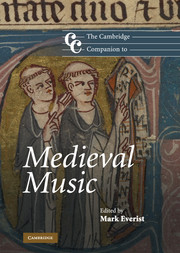8 - The trecento
from Part II - Topography
Published online by Cambridge University Press: 28 September 2011
Summary
The Italian peninsula in the fourteenth century was divided into a great number of communes, republics (the most important being the Most Serene Republic of Venice) and signorie (the Savoia in Piedmont, Scaligeri in Verona, Visconti in Milan, Carraresi in Padua, Malaspina in Lunigiana, Pepoli in Bologna, Gonzaga in Mantua, Este in Ferrara, Manfredi in Faenza, Malatesta in Rimini and Pesaro, Da Polenta in Ravenna, Montefeltro in Urbino, and so on). Every state of some importance had a rich cultural life in which the production and consumption of music played a primary role.
Italian cities were very open at first to Provençal and then to French influence, not only in the Marca Trevigiana (Veneto), in Lombardy (the then name for the western part of north Italy), and in Romagna, but even in the kingdom of Sicily (since the time of Frederick II and then with the Angevin line of Charles I, Charles II, Robert and Joan I). During the time the Holy See was transferred to Avignon (1309–77), exchanges between Romeand Francewere inevitable. This strong permeability between cultures reveals how Italy was not provincial but an environment open to receive the best European artists of the time. This also partly explains, on the one hand, the lack of surviving musical output in vernacular Italian and, on the other, the reason why numerous codices in Italy contain Provençal songs (two thirds of surviving Provençal song books were written in the Veneto during the thirteenth and fourteenth centuries).
- Type
- Chapter
- Information
- The Cambridge Companion to Medieval Music , pp. 136 - 160Publisher: Cambridge University PressPrint publication year: 2011
- 1
- Cited by



